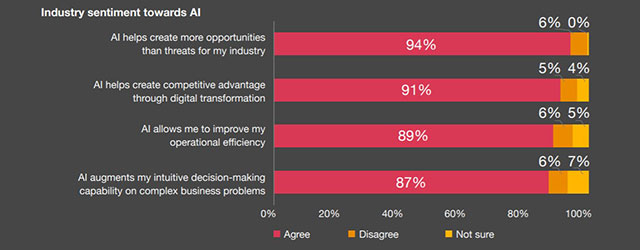
AI adoption highest in India amid Covid-19: PwC


The Covid-19 pandemic has accelerated the adoption of artificial intelligence (AI) and advanced analytics around the world, with India witnessing the highest growth in the segment, accounting conglomerate PwC said in a report titled AI: An opportunity amidst a crisis.
In the country, more than 70% of enterprises have implemented AI systems in one or more functional areas of their business, the report said, citing interviews with over 200 CXOs and decision makers across different sectors of the market and a larger global survey of 670 businesses.
Last year, the rate of implementation stood at about 62%.

Artificial intelligence includes technologies capable of learning from vast chunks of data and then sensing, thinking, and acting like human beings to automatically solve complex problems effectively at scale. It has been deployed for a range of applications, including the creation of chatbots, implementation of facial recognition, image classification, aggregation, recommendation and targeted marketing.
The Covid-19 pandemic has propelled the adoption of AI further, with organisations in India going digital and accelerating investments in the technology to repair, rethink, and reconfigure and ensure business continuity.
This year, about 45% of Indian organisations are estimated to have increased the use of AI due to the pandemic, according to the report. This is significantly higher than the numbers recorded in the UK, US and Japan, where the percentage of organisations pushing AI as part of their pandemic response measures were 23%, 35% and 28%, respectively.

Sector-wise, 89% of companies in the travel and hospitality segment -- one of the most Covid-disrupted segments -- took the lead in AI implementation, followed by technology, media, and telecom at 86%, financial services at 82%, and healthcare and pharma at 73%.
“If this trend continues over the next couple of years, India will be well positioned to be a global powerhouse in AI,” the report said. “This requires India to not just follow what other countries are doing with respect to AI but also take a unique Indian approach to AI.”


Industry sentiment towards AI | Credit: PwC
The survey conducted by PwC also revealed that the optimism with regard to the implementation of AI in Indian organisations has grown significantly to 92% this year from 72% in 2019.
In fact, as many as 94% of the survey respondents claimed that they have either implemented AI in their organisation or are planning to do so. The key functional areas where AI implementation is being considered are for driving revenues, optimising costs or managing risks.

Most of the respondents were of the view that AI can create more opportunities, competitive advantages as well as improve operational efficiencies and decision-making capabilities.
Among other things, the report also notes that the top inhibiting factors for businesses leveraging AI have evolved from purely technical aspects to business-related elements such as measuring the AI’s RoI, selection of right use cases to maximise benefits, and training employees on using AI-powered systems.
This change, the report said, indicates that businesses have matured in AI adoption from the phase of conducting limited pilots to attempting to scale up the technology to the enterprise level.

Moving ahead, it added, if these inhibitors are ruled out and AI adoption continues to grow, the world could see $15.7 trillion worth economic value addition by 2030, with certain economies getting a boost of up to 26%.
Commenting on the study results, Sudipta Ghosh, partner and leader for data and analytics at PwC India, said, “To get the best out of AI, businesses need to start viewing it as a necessity rather than luxury and weave it into the fabric of the enterprise. In developing countries like ours, improving demand may be a potentially more relevant benefit than savings through automation. Hence, given the availability of a large pool of skilled resources, AI efforts need to be directed towards complementing human capabilities and helping businesses prepare for the future.”
